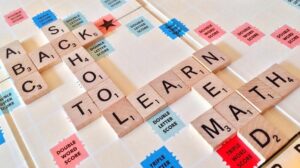 I was behind the door when grammar was taught in eighth grade.
I was behind the door when grammar was taught in eighth grade.
It was not until I studied Greek that I began to understand English.
My undergraduate studies included coursework in Koinέ Greek, the everyday language spoken in the New Testament Roman world. Perhaps it was that we learned the syntactical structure of Greek, the building blocks of the language, from the outset. But I can still point to the day and the page in a textbook that changed my language life. [1] I felt like the blind man, “Once I was blind! But now I see!”
I wrote a bit about this in an essay from 2008 where I said,
I fell in love with small words that told other words what to do and where to go. I was introduced to “from,” “in,” “through” and other prepositions in college Greek classes. The importance of directional connectors cannot be overestimated. To this day I am impressed by the versatility of language, the multi-colored interaction of words with each other. [2]
 Teachers use different metaphors to mark the process of educational euphoria. We say, “I saw the lightbulb go on over their head” or “The roadblock was removed when they saw . . .” or simply hearing this phrase from the excited face of a student, “I get it now!”
Teachers use different metaphors to mark the process of educational euphoria. We say, “I saw the lightbulb go on over their head” or “The roadblock was removed when they saw . . .” or simply hearing this phrase from the excited face of a student, “I get it now!”
I finally “got” English grammar studying an ancient language from a 2000-year-old text. The lightbulb “went on.” I think about my own experience often, especially when I see a student in my class struggling with comprehension of a concept.
My love of prepositions helped to further a love for students. In these days of young minds teetering on the precipice of mental health difficulties, my own struggles – minor as they may seem in comparison – have altered how I connect with students.
 A young man so labored in a high school class I taught that I knew he could not pass, even with one-on-one help. So along with my tutoring, I had him create an electronic quiz board for a grade. His skills were electronic and tactile. He was elated to create the educational game that could help reinforce learning for others. He passed my class, not because he had mastered the course content but because he made something with his hands; a skill he could control. I have not told that story in print until now.
A young man so labored in a high school class I taught that I knew he could not pass, even with one-on-one help. So along with my tutoring, I had him create an electronic quiz board for a grade. His skills were electronic and tactile. He was elated to create the educational game that could help reinforce learning for others. He passed my class, not because he had mastered the course content but because he made something with his hands; a skill he could control. I have not told that story in print until now.
Perhaps I breached some educational ethic by doing what I did for that young man. You, the reader, can take from the story what you will. To me, my empathy for a high school mind was amplified by my own lack, my inability to fully comprehend my own language.
 So impactful has the process been that I have thought various educational practices should change. Because I am spending more time in the second half of my life in undergraduate and graduate education, I will focus my lessons there.
So impactful has the process been that I have thought various educational practices should change. Because I am spending more time in the second half of my life in undergraduate and graduate education, I will focus my lessons there.
Anyone studying for a PhD in whatever field of study should have to teach three years of high school before teaching in a university. If you don’t understand how to teach an eighteen-year-old brain as a senior in high school you will not know how best to teach that eighteen year old brain the freshman year of their college instruction.
Professors should rethink how to give exams. In fact, I would offer that exams be replaced by weekly quizzes that could then be the basis for a cumulative exam at the end of a semester with the exact same questions. If in week three of the semester students are expected to know essential concepts, those same concepts could be repeated and reinforced in weeks four through fifteen. In fact, I would argue that in most coursework, the best way for students to take an exam is to write the exam.
 More than anything, professors need to remember what it means to be a student. For those who have mastered their discipline they should also master how to teach people. I suspect, I can only confirm by anecdotal evidence, that some profs are hard on students because someone in their past was hard on them. Instructors should care for pupils. Teachers should care as much for how they teach as what they teach.
More than anything, professors need to remember what it means to be a student. For those who have mastered their discipline they should also master how to teach people. I suspect, I can only confirm by anecdotal evidence, that some profs are hard on students because someone in their past was hard on them. Instructors should care for pupils. Teachers should care as much for how they teach as what they teach.
Eighth grade was a long time ago for me. But the grammatical problems persist. I am taking a graduate course in linguistics right now. We took our first test last week. [3] I spent 12 hours on the take-home exam. I managed to earn a “B.” To this day, there are phonological concepts of my own language that are more Martian than American to me.
 My comments here are not meant to be a new imperative for educational dictates. Lord knows we do not need any more top-down directives from some governmental agency. But my plea is simple. Teachers, remember what it was like to struggle in your own educational experience. Maybe you “aced” all your classwork at every level. Congrats. Now think about how you felt when you couldn’t compete on the athletic field or you couldn’t carry on a conversation with someone who knew less than you or consider how your academic pride was (and perhaps, still is) a stumbling block for others.
My comments here are not meant to be a new imperative for educational dictates. Lord knows we do not need any more top-down directives from some governmental agency. But my plea is simple. Teachers, remember what it was like to struggle in your own educational experience. Maybe you “aced” all your classwork at every level. Congrats. Now think about how you felt when you couldn’t compete on the athletic field or you couldn’t carry on a conversation with someone who knew less than you or consider how your academic pride was (and perhaps, still is) a stumbling block for others.
 By no means have I “arrived.” But I know what it feels like to fail as a student and it has changed me as a professor.
By no means have I “arrived.” But I know what it feels like to fail as a student and it has changed me as a professor.
Inability to understand my own language transformed my teaching.
I was saved by prepositions.
[1] For those who know or remember, Dana and Mantey’s famous “Diagram of the Directive and Local Functions of Prepositions” in their A Manual Grammar of the Greek New Testament is the best visual picture to communicate prepositional usage (p. 113).
[2] You can find the essay on my website here.
[3] For the record, I have not taken a test since 1982. My PhD studies only demanded written work.

An occasional, personal writing. Find my bio here.


Thank you Mark! This is one of the most important articles I have read in awhile! Thank you for your transparency and integrity. I look forward to your next discussion. Blessings and Shalom!
Dr. Belinda Fontanez